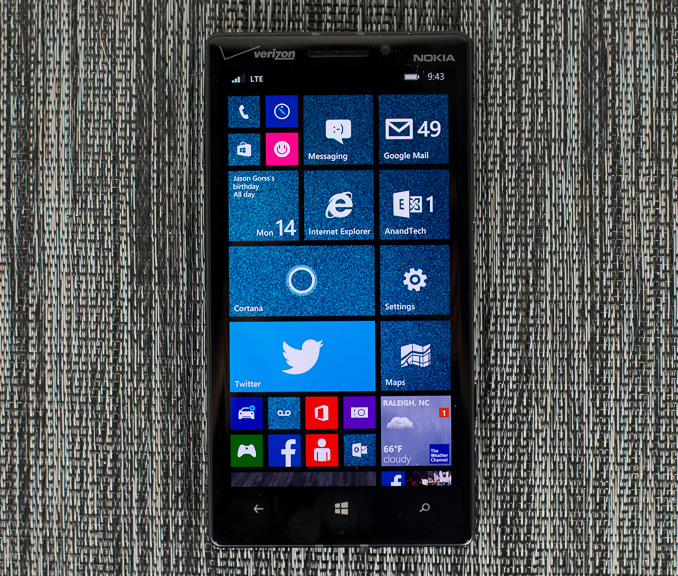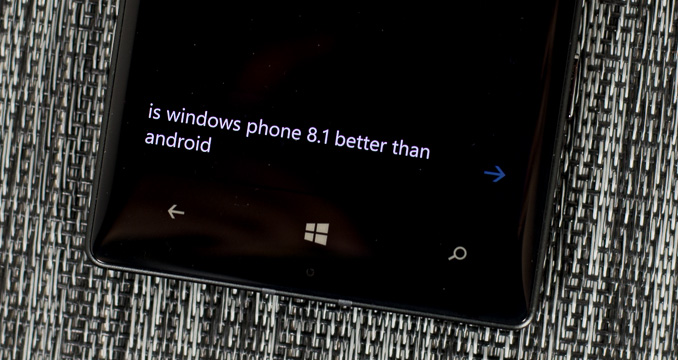Windows Phone 8.1 Review
by Anand Lal Shimpi on April 14, 2014 10:00 PM EST- Posted in
- Smartphones
- Microsoft
- Mobile
- windows phone
- Windows Phone 8.1
Final Words
Windows Phone 8.1 is a much needed and well thought out upgrade to the WP platform. Action Center is extremely well executed. The new keyboard brings the most polished implementation of shape writing to Windows Phone. IE11 is faster and more compatible than IE10. And Cortana offers hope in the way of eventually turning Windows Phone into even more of a personal digital assistant. The upgrades are solid.
In terms of high level features, Windows Phone 8.1 brings the platform up to near parity with Android and iOS. If what you’re doing is calendar, basic camera work, email, SMS, web browsing, Facebook and Twitter you can have a good experience on all three platforms. In fact, there’s an attention to detail that Microsoft exhibits in Windows Phone 8.1 that at times rivals that of Apple. I suspect this is why Windows Phone users, although a small portion of the market, are generally satisfied with their platform.
With Windows Phone however, Microsoft finds itself in a very frustrating position. It lacks the marketshare necessary to make Windows Phone a primary target for developers. Apps are more likely to launch first on Android and/or iOS. Part of the problem is one of marketshare, the other part is one of philosophy. For the past 3.5 years Microsoft needed to rev Windows Phone more frequently than Android or iOS, and it needed to be on the forefront of hardware adoption as well. For whatever reason, Microsoft did neither. Windows Phone saw, at best, as many major OS updates as Android/iOS, and at worst trailed the two in terms of minor updates. I’d argue that both Android and iOS changed more since Windows Phone’s introduction than WP itself, which shouldn’t be the case as both of those platforms are far older (and thus should be more mature/changing less substantially). On the hardware side, it’s important to note that no one ever wins by consciously choosing slower hardware. Building efficient software is one thing, but failing to use the latest hardware isn’t doing anyone any favors.
Last year saw Microsoft accelerate its software release cadence, and by the end of the year was on parity with Android in terms of high end Qualcomm silicon support. These two trends must continue through 2014 and beyond for Windows Phone to continue to grow. The UI needs regular updates/tweaks to keep it fresh but also keep it evolving towards perfection. With faster hardware on the horizon, Windows Phone can no longer be the last to support the latest platforms. I can’t say I have a ton of faith that Windows Phone will become the launch platform of choice for new silicon, but I do hope the lag between what is offered on Android and WP will narrow to at most a couple of quarters.
Microsoft has a huge opportunity in its universal app strategy. Being able to run the same app on smartphone, tablet, notebook and desktop is a sort of holy grail for the next stage in the computing evolution. I honestly see the biggest strength there in gaming, but for that to work out Microsoft not only needs to push its mobile hardware more than anyone else but it also needs to treat Xbox as a platform and not as a console.
So what about Windows Phone 8.1 today? The hardware is decent and the software just saw a solid upgrade. Going back to the platform after a significant hiatus I’m quickly reminded of why it is a reasonable third choice. I’m still not a fan of the overuse of text as a navigational element, but between Action Center and aggressive use of the start screen you should be able to avoid a lot of that. Personally I'd still prefer Android or iOS. The Google services experience is understandably better under Android and unless you're using Skype exclusively, messaging is better under Android and iOS. Then there's the third party app story. The Windows Phone Store is healthier today than it was four years ago, but if you want the latest and greatest apps as they hit the market you'll want to be on Android or iOS. (Can I also add that only having three brightness settings and a ton of devices that won't let you force the display on makes testing these things a nightmare?)
I believe Windows Phone’s biggest strength continues to be as an entry level smartphone platform. If you don’t need the flexibility and bleeding edge feature/app set that Android offers, and you don’t want to invest as much financially into moving to iOS, Windows Phone offers a unique middle ground between the two platforms. With the majority of growth in the smartphone space over the coming years moving to the entry level and mainstream segments, that’s Windows Phone’s real opportunity. What’s needed is the Moto G equivalent in the Windows Phone space. The high end Nokia devices are interesting from a camera perspective, but I suspect the real chance to win is if Nokia can point its camera excellence at a more mainstream price point.












111 Comments
View All Comments
Hrel - Friday, April 18, 2014 - link
Get the dolphin browser. The other must have app for me, touchpal keyboard.vanster - Monday, April 21, 2014 - link
maybe just for some site not all site, yeah iphone and IE not doing what you mean, but i never try it on androidStormyParis - Monday, April 14, 2014 - link
I'm not sure text can be overused as a UI element. I'm a geek, and I'm sometimes baffled by icons or even worse gestures (which have 0 discoverability). Text is immediately obvious, visible... My non-geek relatives feel even more strongly about this:: it doesn't look good, but it is extremmely user-friendly, especially casual-user friendly.An example: if I want to send a text, do I click on this envelope, or that one ? "Text" vs "email" is way clearer.
StormyParis - Monday, April 14, 2014 - link
I didn't know only Android had that. Indeed, I use it all the time, whether with the basic browser or Opera.jeffkibuule - Monday, April 14, 2014 - link
Most people read words in their head before recognizing them, which makes them slower to process in the brain. Plus, compared to images, text is *obviously* language dependent. I often think the white text on black background motif is overdone since it makes apps look rather monotonous. Screens have color for a reason, color communicates a LOT more densely that text ever will.dorekk - Saturday, June 21, 2014 - link
"Most people read words in their head before recognizing them"That's not true. The way most people read is by recognizing whole-word shapes subconsciously.
nafhan - Tuesday, April 15, 2014 - link
That sounds like it would be more of an issue for people changing devices all the time. I just tap the mail icon that's always the same and always in the same spot on my primary home screen.Kenazo - Monday, April 14, 2014 - link
Next thing we'll be seeing a review of BlackBerry 10.2.1 on the Z30 (actually I wouldn't mind reading that....)creed3020 - Tuesday, April 15, 2014 - link
Would be nice to see some more coverage in that area but I'm doubtful that AT is going to even consider BB devices.For example the BB browser is excellent, it's get a score of 491 out of 555. I'd love to see how a Z30 compares in some of these benchmarks as conducted by a trusted source like AT.
cashkennedy - Wednesday, April 16, 2014 - link
The scores on the HTML5 benchmark are fairly useless because half of the score is for form elements and other silly coding that no one uses. Yes IE11 doesn't support a color input type that will come so handy.